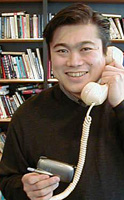We want wisdom. We want hope. We want to be good. Therefore we sometimes tell ourselves warning stories that deal with the darker side of some of our other wants. As William Blake noted long ago, the human imagination drives the world. At first it drove only the human world, which was once very small in comparison to the huge and powerful natural world around it. Now we're close to being in control of everything except earthquakes and the weather. But it is still the human imagination, in all its diversity, that directs what we do with our tools. Literature is an uttering, or outering, of the human imagination.
'Aliens have taken the place of angels'
Margaret Atwood on why we need science fiction
Friday June 17, 2005
If you're writing about the future and you aren't doing forecast journalism, you'll probably be writing something people will call either science fiction or speculative fiction. I like to make a distinction between science fiction proper and speculative fiction. For me, the science fiction label belongs on books with things in them that we can't yet do, such as going through a wormhole in space to another universe; and speculative fiction means a work that employs the means already to hand, such as DNA identification and credit cards, and that takes place on Planet Earth. But the terms are fluid. Some use speculative fiction as an umbrella covering science fiction and all its hyphenated forms - science fiction fantasy, and so forth - and others choose the reverse.
I have written two works of science fiction or, if you prefer, speculative fiction: The Handmaid's Tale and Oryx and Crake. Here are some of the things these kinds of narratives can do that socially realistic novels cannot do.
· They can explore the consequences of new and proposed technologies in graphic ways, by showing them as fully operational. We've always been good at letting cats out of bags and genies out of bottles, we just haven't been very good at putting them back in again. These stories in their darker modes are all versions of The Sorcerer's Apprentice: the apprentice finds out how to make the magic salt-grinder produce salt, but he can't turn it off.
· They can explore the nature and limits of what it means to be human in graphic ways, by pushing the envelope as far as it will go.
· They can explore the relationship of man to the universe, an exploration that often takes us in the direction of religion and can meld easily with mythology - an exploration that can happen within the conventions of realism only through conversations and soliloquies.
· They can explore proposed changes in social organisation, by showing what they might actually be like for those living within them. Thus, the utopia and the dystopia, which have proved over and over again that we have a better idea about how to make hell on earth than we do about how to make heaven. The history of the 20th century, where a couple of societies took a crack at utopia on a large scale and ended up with the inferno, would bear this out. Think of Cambodia under Pol Pot.
· They can explore the realms of the imagination by taking us boldly where no man has gone before. Thus the space ship, thus the inner space of the hilarious film Fantastic Voyage, the one where Raquel Welch gets miniaturised and shot through the blood stream in a submarine. Thus also the cyberspace trips of William Gibson; and thus The Matrix, Part 1 - this last, by the way, an adventure romance with strong overtones of Christian allegory, and therefore more closely related to The Pilgrim's Progress than to Pride and Prejudice.
More than one commentator has mentioned that science fiction as a form is where theological narrative went after Paradise Lost, and this is undoubtedly true. Supernatural creatures with wings, and burning bushes that speak, are unlikely to be encountered in a novel about stockbrokers, unless the stockbrokers have been taking a few mind-altering substances, but they are not out of place on Planet X. The form is often used as a way of acting out the consequences of a theological doctrine. The theological resonances in films such as Star Wars are more than obvious. Extraterrestrials have taken the place of angels, demons, fairies and saints, though it must be said that this last group is now making a comeback.
We want wisdom. We want hope. We want to be good. Therefore we sometimes tell ourselves warning stories that deal with the darker side of some of our other wants. As William Blake noted long ago, the human imagination drives the world. At first it drove only the human world, which was once very small in comparison to the huge and powerful natural world around it. Now we're close to being in control of everything except earthquakes and the weather.
But it is still the human imagination, in all its diversity, that directs what we do with our tools. Literature is an uttering, or outering, of the human imagination. It lets the shadowy forms of thought and feeling - heaven, hell, monsters, angels and all - out into the light, where we can take a good look at them and perhaps come to a better understanding of who we are and what we want, and what the limits to those wants may be. Understanding the imagination is no longer a pastime, but a necessity; because increasingly, if we can imagine it, we'll be able to do it.

 That is the simple but mighty insight that the physicist John Wheeler sought to capture in this schematic image of a universe that makes a u-turn in time to study itself through the human eye.
That is the simple but mighty insight that the physicist John Wheeler sought to capture in this schematic image of a universe that makes a u-turn in time to study itself through the human eye.  The ecological unconscious is regenerated, as if it were a gift, in the newborn's enchanted sense of the world. Ecopsychology seeks to recover the child's innately animistic quality of experience in functionally "sane" adults. To do this, it turns to many sources, among them traditional healing techniques of primary people, nature mysticism as expressed in religion and art, the experience of wilderness, the insights of Deep Ecology. Thus, for example, Wordsworth's hymns to the child's love of nature are basic texts for developmental ecopsychology, a first step toward creating the ecological ego.
The ecological unconscious is regenerated, as if it were a gift, in the newborn's enchanted sense of the world. Ecopsychology seeks to recover the child's innately animistic quality of experience in functionally "sane" adults. To do this, it turns to many sources, among them traditional healing techniques of primary people, nature mysticism as expressed in religion and art, the experience of wilderness, the insights of Deep Ecology. Thus, for example, Wordsworth's hymns to the child's love of nature are basic texts for developmental ecopsychology, a first step toward creating the ecological ego.


 Review of:
Review of: 


 Andy Warhol might have seen it all coming when he uttered the phrase, "Someday, everybody will be famous for 15 minutes." What we now know, fame or not, our ability to express ourselves to the outside world is a 24/7 possibility. We have the blog.
Andy Warhol might have seen it all coming when he uttered the phrase, "Someday, everybody will be famous for 15 minutes." What we now know, fame or not, our ability to express ourselves to the outside world is a 24/7 possibility. We have the blog.
 Everyone will have the ability to broadcast. What will drive traffic and generate an audience will not only be the publishers' commitment to ideas, but also a seamless delivery of content in real time. The recent tsunami coverage shows how the democracy of information works. Within hours, we were all connected to the most hard-hit areas. A digital camera and a laptop with a broadband connection are all that is required for entry into this new dynamic and decentralized media landscape.
Everyone will have the ability to broadcast. What will drive traffic and generate an audience will not only be the publishers' commitment to ideas, but also a seamless delivery of content in real time. The recent tsunami coverage shows how the democracy of information works. Within hours, we were all connected to the most hard-hit areas. A digital camera and a laptop with a broadband connection are all that is required for entry into this new dynamic and decentralized media landscape. For example the
For example the  The revolution will also fuel the need for tools that simplify the creation of content. Take iPod, for example. Phase two of the revolution has begun with "
The revolution will also fuel the need for tools that simplify the creation of content. Take iPod, for example. Phase two of the revolution has begun with " A virtual community is no different from a real one. Both are made up of self selecting members who have similar needs and interests. Internet communities have rules and guidelines that participants must follow, and volunteer watchdogs ensure that bloggers follow these rules. Offenders are banished from the collective. And perhaps most importantly, consensus will be achieved as a byproduct of this community sharing resources.
A virtual community is no different from a real one. Both are made up of self selecting members who have similar needs and interests. Internet communities have rules and guidelines that participants must follow, and volunteer watchdogs ensure that bloggers follow these rules. Offenders are banished from the collective. And perhaps most importantly, consensus will be achieved as a byproduct of this community sharing resources. He has been living out there all his 37 years, bobbing and weaving between Japan, the States and Canada through his school years (college never completed). He's been dancing with Internet technology since his childhood, politicking, investing,
He has been living out there all his 37 years, bobbing and weaving between Japan, the States and Canada through his school years (college never completed). He's been dancing with Internet technology since his childhood, politicking, investing, 
 .
.